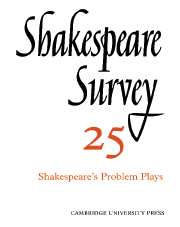Book contents
- Frontmatter
- The Problem Plays, 1920–1970: A Retrospect
- ‘Sons and Daughters of the Game’: An Essay on Shakespeare’s ‘Troilus and Cressida’
- The Options of the Audience: Theory and Practice in Peter Brook’s ‘Measure for Measure’
- Man’s Need and God’s Plan in ‘Measure for Measure’ and Mark iv
- The Design of ‘All’s Well That Ends Well’
- Directing Problem Plays: John Barton Talks to Gareth Lloyd Evans
- The Queen Mab Speech in ‘Romeo and Juliet’
- ‘Time’s Deformed Hand’: Sequence, Consequence, and Inconsequence in ‘The Comedy of Errors’
- Faith and Fashion in ‘Much Ado About Nothing’
- ‘The Merry Wives of Windsor’ as a Hallowe’en Play
- ‘The Tempest’ at the Turn of the Century: Cross-Currents in Production
- Variations Within A Source: From Isaiah XXIX To ‘The Tempest’
- The Life of George Wilkins
- A Neurotic Portia
- Of an Age and for All Time: Shakespeare at Stratford
- The Year's Contributions to Shakespearian Study 1 Critical Studies
- 2 Shakespeare’s Life, Times, and Stage
- 3 Textual Studies
- Index
- Plate section
The Options of the Audience: Theory and Practice in Peter Brook’s ‘Measure for Measure’
Published online by Cambridge University Press: 28 March 2007
- Frontmatter
- The Problem Plays, 1920–1970: A Retrospect
- ‘Sons and Daughters of the Game’: An Essay on Shakespeare’s ‘Troilus and Cressida’
- The Options of the Audience: Theory and Practice in Peter Brook’s ‘Measure for Measure’
- Man’s Need and God’s Plan in ‘Measure for Measure’ and Mark iv
- The Design of ‘All’s Well That Ends Well’
- Directing Problem Plays: John Barton Talks to Gareth Lloyd Evans
- The Queen Mab Speech in ‘Romeo and Juliet’
- ‘Time’s Deformed Hand’: Sequence, Consequence, and Inconsequence in ‘The Comedy of Errors’
- Faith and Fashion in ‘Much Ado About Nothing’
- ‘The Merry Wives of Windsor’ as a Hallowe’en Play
- ‘The Tempest’ at the Turn of the Century: Cross-Currents in Production
- Variations Within A Source: From Isaiah XXIX To ‘The Tempest’
- The Life of George Wilkins
- A Neurotic Portia
- Of an Age and for All Time: Shakespeare at Stratford
- The Year's Contributions to Shakespearian Study 1 Critical Studies
- 2 Shakespeare’s Life, Times, and Stage
- 3 Textual Studies
- Index
- Plate section
Summary
Many years ago, after watching the Rosalind played by Edith Evans, an enthusiastic critic exclaimed, ‘She made the audience one Orlando’. However imprecise this phrase may be, it captures some essential virtues of a superb portrayal: the ability to seduce us, to hypnotize, to convince us of charm and vigor–those qualities that come across immediately and fully in an excellent production. Like pace, rhythm, and humor, such virtues tend to elude us in our private studies and our chalky class-rooms. We all recognize that, unfortunately, the personal magnetism of an Edith Evans is not a universal option, but a rare one. The Rosalinds, for example, that I have been able to see, stopped far short of making me into an Orlando. They range from the actress, best left nameless, who played the role as if she were a rookie offensive guard for the New York Giants, to Ronald Pickup, the lead in the all-male Old Vic version of 1968. Pickup was a charming Rosalind, but far weaker than both a virile Orlando and a wryly witty Celia.
As You Like It can succeed whether its heroine is idealized or realistic, brilliant or subdued. But the charisma of a great Rosalind - Shakespeare's most effectively dominating comic heroine - would probably distort many other leading roles in his comedies. For recent audiences Valentine, Bassanio, and Claudio seem more credible if their unappealing selfishness receives some sporadic emphasis than if they are treated as nearly flawless conventional romance figures. Successful productions often induce diverging attitudes toward the same character or idea.
- Type
- Chapter
- Information
- Shakespeare Survey , pp. 27 - 36Publisher: Cambridge University PressPrint publication year: 1972
- 1
- Cited by



